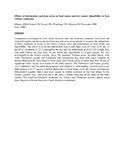Effects of dehydration and heat stress on food intake and dry matter digestibility in East African ruminants

View/
Date
2008Author
Maloiy, GMO
Kanui, TI
Towett, PK
Wambugu, SN
Miaron, JO
Wanyoike, MM
Type
ArticleLanguage
enMetadata
Show full item recordAbstract
Comparative investigations were made between wild and domestic ruminants from arid and semi-arid regions and those species from non-arid areas in an attempt to evaluate the adaptations of these ruminants in terms of the effects of heat stress and dehydration on food intake and digestibility. The effect of (a) an intermittent heat load (a daily light cycle of 12 hat 22 "C and 12 hat 40 'C) compared to 22 'C throughout the day and (b) dehydration level of 15% weight loss, with and without the heat load, on the intake and digestibility of a poor quality hay was investigated in the Grant's gazelle, Oryx, the domestic Turkana goats, fat-tailed sheep, zebu cattle, Thomson's gazelle and wildebeest The intermittent heat load with water available ad libitum depressed the food intake of zebu cattle and Turkana goats by more than 40%. It had no significant effect on the food intake of the other species. The Thomson's and Grants gazelle, oryx, wildebeest and fat-tailed sheep appear well adapted to withstanding a periodic heat load. Dehydration at 22 'C caused a marked depression on food intake of all the species investigated. Dehydration together with a heat load caused no further reduction in the food intake by the Grants's gazelle, oryx, and goats but it did cause a further reduction in the intake in the other species. The small non-domestic ruminants (i.e. Grant's and Thomson's gazelle) appear much more digestive efficient than any of their domestic counterpart.
